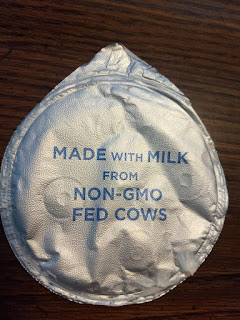I saw this proclamation on my yogurt. I thought, "They want a gold star for this?"
The message is that eating yogurt that was processed from milk that was produced by cows that consumed food that was not genetically modified is noteworthy.
A marketing statement like this implies that any connection whatsoever to anything genetically modified must be unhealthy, but it doesn't give further information. This message influences consumers' opinion of the product without presenting any background facts. Consumers are influenced by messages about what is healthy or not, but do we take the time to do actual research or form our own opinions?
A marketing statement like this implies that any connection whatsoever to anything genetically modified must be unhealthy, but it doesn't give further information. This message influences consumers' opinion of the product without presenting any background facts. Consumers are influenced by messages about what is healthy or not, but do we take the time to do actual research or form our own opinions?
It's like how you'll find "gluten-free" labels on foods that are obviously not glutenous in any way shape or form (e.g. milk). Some people assume that since since gluten-free foods are highly sought out by some people - you know, like people who are allergic to gluten - that they must be more desirable. And gluten-free food is often more expensive, so it must be better in some way. They conclude that it must be healthier. When food companies plaster gluten-free labels all over the packaging, they send a message to uninformed consumers that gluten is inherently bad.
The point is that we need to get the information from sources other than marketing. As consumers, we have the responsibility to search out correct information about food from sources that don't have an ulterior motive. We need to make conscious, informed choices about what foods are acceptable, rather than following the messages on our food packaging.

No comments:
Post a Comment